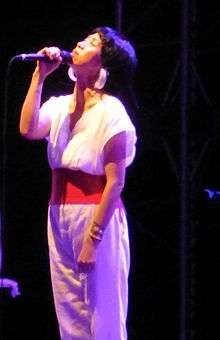Ua (singer)
Kaori Hasegawa (長谷川 歌織, Hasegawa Kaori) (born March 11, 1972 in Suita, Osaka, Japan), simply known by the stage name UA (Japanese pronunciation: [ɯːa]), is a Japanese singer-songwriter. She made her debut under Speedstar Records in 1995, with the single "Horizon".[1]
Ua | |
|---|---|
 | |
| Born | Kaori Shima 嶋 歌織 (Shima Kaori) March 11, 1972 |
| Occupation |
|
| Spouse(s) | Bishū Hasegawa
( m. 2008) |
| Musical career | |
| Genres | |
| Years active | 1994–present |
| Associated acts | |
| Website | Official website |
Biography
Ua was born Kaori Shima and grew up in Suita, Osaka. After graduating from Saga University of Arts in Kyoto, she worked as a lounge singer in her hometown. There, she was scouted by producer Hiroshi Fujiwara. She took on the unusual stage name of UA (a Swahili word that means both "flower" and "kill") and made her debut with the Fujiwara-produced "Horizon".[2] Her fourth single "Jōnetsu" became a smash hit and Ua was recognized all over Japan.[1]
After releasing her first album, 11, Ua married actor Jun Murakami and gave birth to a son.[3] The couple divorced in 2006.[3] In 2000, after two more albums, Ametora and Turbo, Ua took a hiatus from her solo work and formed the band Ajico with Kenichi Asai.[1] She resumed her solo activities in 2002 and released her fourth album, Dorobō. The same year she made her acting debut as the leading role in the film Mizu no Onna, as well as contributing to the soundtrack.[1] The film went on to win the Golden Alexander prize for Best Feature-Length Film at the International Thessaloniki Film Festival and was screened at the 2003 Cannes Film Festival.[1]
In 2003, Ua released Illuminate: The Very Best Songs, her first compilation album.[4] In April that year, she expanded her activities by becoming the hostess named ううあ (the pronunciation remains the same since it is meant to be a phonetic representation of her usual stagename) of an educational TV program on NHK called Do Re Mi no TV, designed to pass along Japanese traditional songs to children.[1] Utauua, a compilation of the songs performed, was released in 2004.[5] The same year she released her fifth album, Sun, which was mastered by grammy-winning mastering engineer Ted Jensen.[1] In 2005, she released her sixth album, Breathe, and a compilation album of collaborations titled Nephews to mark her 10th anniversary.[6][7] In 2006, Ua collaborated with renowned jazz musician Naruyoshi Kikuchi on the album Cure Jazz.[8] In 2007, in addition to releasing her seventh album Golden Green, Ua made a second foray into acting by appearing in Hitoshi Matsumoto's directorial debut Dai Nipponjin.[9][10]
In 2008, Ua revealed that she married again and gave birth to a daughter, in August. In December, she released the single "2008", followed by her eighth album, Atta, in July 2009.[3][11][12] In April 2010, Ua released her fourth live album, entitled Haluto Live.[13]
In September 2010, her combined house and studio in Sagamihara accidentally burned down; no one was injured.[14]
Discography
- 11 (1996)
- Ametora (1998)
- Turbo (1999)
- Dorobō (2002)
- Sun (2004)
- Breathe (2005)
- Golden Green (2007)
- Atta (2009)
- Sound of Music (2015)
- JaPo (2016)
Filmography
| Film | |||
|---|---|---|---|
| Year | Title | Role | Notes |
| 2002 | Mizu no Onna | Ryo Shimizu | Lead role |
| 2007 | Dai Nipponjin | Manager Kobori | |
| 2009 | Eatrip | Herself | Documentary movie |
| Television | |||
| Year | Title | Role | Notes |
| 2002 | Shiritsu Tantei Hama Mike | Naomi | Episode 2 |
| 2003–2006 | Do Re Mi no TV | Uua | |
References
- "UA – artister – JaME Sverige". JaME World. July 18, 2009. Retrieved April 22, 2010.
- "UA : バイオグラフィー / BARKS アーティスト". Barks (in Japanese). January 10, 2007. Retrieved April 22, 2010.
- "UA pregnant with second child – Tokyograph". Tokyograph. May 5, 2008. Retrieved April 22, 2010.
- "[UA] 初のベストアルバムを2枚組で発表!映像作品も同時リリース!|エキサイトミュージック(音楽)". Excite (in Japanese). August 13, 2003. Retrieved April 22, 2010.
- "UAの沖縄民謡が日仏合作映画「ユキとニナ」主題歌に抜擢 – livedoor ニュース". Livedoor (in Japanese). December 22, 2009. Retrieved April 22, 2010.
- "UAが日比谷野外音楽堂でのライヴを開催 – OOPS!". Oops! (in Japanese). March 30, 2005. Retrieved April 22, 2010.
- "UAがコラボレーション楽曲などを集めた裏ベスト盤『Nephews』発売 – OOPS!". Oops! (in Japanese). October 6, 2005. Retrieved April 22, 2010.
- "UA×菊地成孔『cure jazz』の全曲試聴がスタート – OOPS!". Oops! (in Japanese). July 1, 2006. Retrieved April 22, 2010.
- "UA(ウーア)アルバム「Golden green」6月20日リリース – OOPS!". Oops! (in Japanese). May 3, 2007. Retrieved April 22, 2010.
- "女性シンガー"UA"松本人志の初監督作品映画「大日本人」に出演 – OOPS!". Oops! (in Japanese). March 30, 2007. Retrieved April 22, 2010.
- "ナタリー – UA新作ジャケ公開&アメトラDVDが低価格で再発". Natalie (in Japanese). November 13, 2008. Retrieved April 22, 2010.
- "ナタリー – "歌手UA"本領発揮アルバム「ATTA」に細野晴臣も参加". Natalie (in Japanese). May 20, 2009. Retrieved April 22, 2010.
- "ナタリー – UA、デビュー15周年記念の東阪野外ワンマンライブ開催". Natalie (in Japanese). April 7, 2010. Retrieved April 22, 2010.
- "UA自宅火災に事務所がコメント「家族4人が怪我もなく、無事な事が不幸中の幸い」". ORICON STYLE (in Japanese). September 27, 2010. Retrieved March 13, 2013.